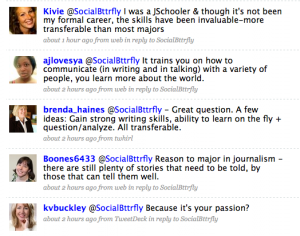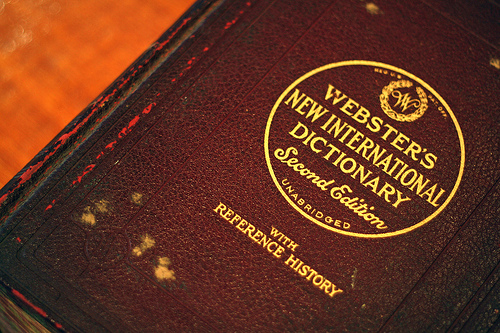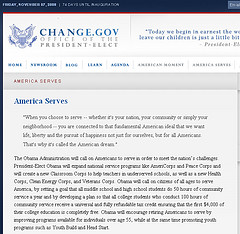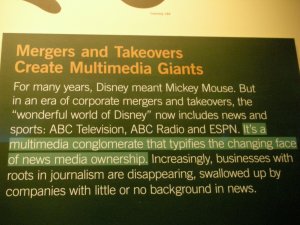I am completely biased in this post because of my own studies in journalism. That said:
Newspapers are downsizing. Jobs are being cut. The journalism field is in the midst of a re-invention. Despite the landscape and view people may hold when they think of today’s journalism, enrollment in journalism school has INCREASED!
Recently on the Mizzou Mafia’s list serv (we do exist), an alum wrote about her frustration when a prospective freshman asked her about a career in journalism. She just felt like she couldn’t encourage the girl to go into a field that she felt was losing hope.
However, when my High School Senior, Class of 2009 cousin asked me about it the other weekend, I was thrilled. I still encourage perspective students and recent grads to continue in the field of journalism. To provide evidence as to why and to help spread hope in the journalism field, I write this letter:
********************
Dear May 2009 Graduate,
Here are 40 reasons to still study journalism:
- We need journalism. As a society, we need journalism to help us be the watchdog, to speak for the people, to highlight issues and areas that need addressed, to highlight people’s voices and to protect our freedoms.
- As a society, we need good journalism. We need journalism that knows its purpose and role in society. We need journalism to remember its roots, and as Walter William said in the Journalist’s Creed, we need journalism to act as a public service.
- We need good journalists. We need journalists who can be jugglers. Journalists who are multi-faceted, sharp, quick, curious, creative, inventive, profound and moving.
- We need journalism’s spirit. Imagine if more of this moved in our words, writing and work: Also from the Journalists Creed: Journalism…“seeks to give every man a chance and, as far as law and honest wage and recognition of human brotherhood can make it so, an equal chance; is profoundly patriotic while sincerely promoting international good will and cementing world-comradeship; is a journalism of humanity, of and for today’s world.”
- We need the next generation’s talent. You grew up with technology. You care about your friends and your communities. You aren’t afraid. We need you, your ideas, your voices, your tech-saavy minds, your perspective, and your willingness to adapt, change and evolve.
- Journalism teaches you to be a writer, and a good one. In just about any profession, you will be a writer at some point. Journalism teaches you how to write. And when you know how to write, people will value this talent and gift no matter what your title, job or industry.
- Journalism teaches you to be a talker, and a good one. Again, in any profession, you will be called upon to speak at some point. Journalism provides you a firm foundation to know what to say, how to say it and why you are saying it.
- Journalism teaches you to defend your stance, your writing and your character. When you write or talk, no matter if it’s in work, in relationships or through your passions, you will need to know why you do what you do and write what you write. You will also need to identify your limits and your “no-fly” zones/issues.
- Journalism teaches you ethics. You might be scoffing. But, in j-school, they really do teach ethics, and it’s fascinating. You are reporting and telling people’s stories. These are real people and real issues that your words and actions will affect. It is not something to take lightly.
- Journalism teaches you to learn on the fly. You will learn something new everyday. Some events you can’t prepare for and sometimes you must be an expert on a situation you just learned about 20 minutes ago. Get ready. (Thanks @brenda_haines for that one!)
- Journalism teaches you how to ask questions, including the tough ones. The field is right there with you, and it’s got your back because people want and need to know. You ask the question not just for yourself or your editor, but because you represent “the people.” This will come in handy because in life, sometimes, it’s easy not to ask the tough ones or to think someone else will do it. But, as a j-schooler, you will learn how to take the initiative and be confident in your curiosity.
- Journalism makes you look at situations, problems and issues from multiple perspectives. It gets you out of your comfort zone. Again, great lessons for life.
- Journalism teaches you to be a good networker. You have to build relationships with your sources and with those gateways to your sources. You also learn how to identify resources, another important aspect of networking.
- Journalism teaches you to be a good researcher. You must fact check, and fact check again. You are given an assignment and you must find out all the answers to all the questions your audience may have about your assignment so you can write the best write-up possible or capture the best video.
- Journalism teaches you confidence. To succeed, especially in broadcast journalism, you have to be confident in your research, words, and actions. It also helps you identify confidence in others, which is a good talent when fact checking sources, seeking talent, choosing a mentor, finding a love interest or when making a friend.
- The world becomes a smaller place. Journalism gives you the platform to meet a diverse amount of people, study diverse issues and if you want, even travel to diverse countries.
- Journalism clues you into newsworthiness. You learn how to be interesting, how to make conversation, how to potentially position a business or what to cover for a blog. Newsworthiness is a subject that I think all should take a class in. For example, can you define all the elements of newsworthiness? Here’s three to get you started: proximity, timeliness and prominence.
- There are cutting-edge and exciting projects developing. The New York Times just hired a Social Media Editor. People are curious if newspapers will become non-profits. Organizations are adopting journalistic principles into their work. It’s an exciting time to get started.
- You can explore your creativity. Writing, photography, art direction, videography, graphic design, Web production, etc. all utilize skills learned in journalism school.
- There are plenty of stories still needing to be told. @Boones6433 helped me with this one, and it’s true. So many rocks still left to uncover, in your community, state, nation and around the globe.
- It’s historic. You can say you were there. You get involved in history by helping to create and influence it.
- People in journalism are diverse, eclectic and interesting. Maybe I’m biased by the program I went to, but you meet people from all walks of life, varied experiences and a long span of passions. It’s inspiring and motivating.
- Gives you an excuse to talk to someone in the know. Doing an interesting piece on dairy recall in stores across the nation? This gives you a perfect reason to try and get in touch with someone at Baskin Robbins or the U.S. Department of Health and Human Services. Better yet, do graduate research on any topic you find interesting and find a way to interview people “in the know.”
- You grow broad shoulders. People will critique your work. If not an editor, then your readers. You learn to brave the wind, and it makes you a better person for it, even beyond the world of journalism.
- Make the right decision the first time. Enrollment of older adults in journalism is increasing. Some reasons are because of its appeal, the breadth of skills it teaches and the variety of doors it opens. Don’t not go to j-school because you are afraid nothing will come of it. Have a better reason for an alternative than fear.
- You can reach more people than ever. With the help of evolving technology, today’s stories have the capability to be heard around the world instantaneously.
- You can be you. According to Mark Glaser at PBS, Web technologies and blogs offer reporters the ability to “explain their conflicts of interest in greater detail, leading to more transparency. Plus, online writing tends to be more personal, giving reporters, editors and news anchors the chance to be more human and connect with their audience in deeper ways.”
- It’s easier to freelance. With blogging and others sites like Craigslist, E-Lance, iFreelance and others, jobs are literally right at your fingertips.
- There are internships galore that you can start doing now. Because of the economic crunch many journalism organizations are facing, the amount of internships have increased….everywhere. With some creativity and some luck, you can even make your own internship opportunity anywhere you want. Journalism can truly be an entrepreneurial field that you define and mold.
- There are top-notch universities with amazing learning labs. For some of the top ones, check out Missouri’s School of Journalism (my alma mater), Columbia, NYU, and Northwestern.
- Inside information is easier to attain. According to the Online Journalism Blog, “wikileaks and the like” have make it easier for people with sensitive information to bypass censorship, making information more available.
- It’s less costly to do. The Online Journalism Blog also notes how today’s journalists can conduct interviews over Skype or through email for free.
- You mom will be proud. You can have a moment of nano-fame when you first get “published” and the byline says your name. Keep it, frame it, dance around and call your mom. I admit I did exactly that.
- You will know how to mediate a conversation. The journalism profession teaches you how to keep conversation going person to person or within groups both small and large. This is helpful for work meetings, making small talk or even arguments amongst friends.
- You will learn how to multi-task. Your phone is ringing with a hot new lead. You have a deadline in a two hours. You still need to fact check. You need to follow-up to some emails and you have a meeting in ten minutes. Yay, like, I said earlier, jugglers.
- You can make a difference. Cliche? Maybe. But you can. Depending on your interests and passions, you can make a difference. I used to report for Adelante on Mid-Missouri’s Latino population. We made a difference as we were the only print voice for Latinos in all of Mid-Missouri by bringing attention to worker conditions, immigration issues and health conditions just to name a few.
- You will learn tangible skills. Studying journalism, you will be able to develop tangible skills. Not just writing, interviewing and researching, but also Web literacy, photoshop techniques, Flash, Studio 8, Videography, video editing, and many more.
- You can pursue graduate education. There are many top-notch graduate programs that can be leveraged to open new doors and opportunities. As I like to say, in journalism, you can own your education. Love the art of journalism, but interested in public health but also like to travel? Then, do a graduate fellowship or research project abroad covering community health. Like studying how technology affects communication? Then, create your own research study to measure an organization’s Diffusion of Innovation.
- It changes everyday. This is more true nowadays than ever before. The field is constantly evolving. Sure, stories may last longer, but being a journalists means different assignments, different interviews and different situations. You won’t be bored.
- Twitter tweeps agree that studying journalism is invaluable. Don’t believe me? Then ask these tweeps:

The goal is to get to 50. I’ve done the first 40. Going with the whole co-creation concept and knowing SB readers are smart and savvy, I figure you’ll have some reasons of your own to expand the list! =)
flickr credit: Jonathan Pobre
************ (from the comments):
#41: Headline writing is great practice in a social world. With only 140 characters on Twitter and the increasing need to be short, simple and to the point. @brenda_haines reminds us that headline writing is great practice for Twitter posting.
#42: MerAnda added–Being a reporter means your job will be cooler, or at least perceived as more interesting, than 95 percent of the kids you went to high school with. When someone asks what you do, they can’t help but want to know more when you say you’re a journalist.
#43: MerAnda added–Even if you don’t get rich (and you probably won’t), you will at least have some great stories to tell. What’s the craziest crash, destruction or natural disaster you’ve ever seen? What was the best performance or speech you’ve attended? Who’s the biggest celeb you’ve met? Most people have responses to these. You will be able to not only top most of them, but because you’ve been trained to notice and remember details, your story will be more vivid and interesting.
#44: MerAnda added–You’ll learn to find interest in subjects you’re not naturally interested in. That will make you a more well rounded person, not only in journalism but also in life.
#45: MerAnda added–Journalism can take you anywhere. There is no geographical limit to stories waiting to be told. And with the Internet and freelance opportunities, there are few limits on the outlets and methods in which those stories can be shared.
#46: MerAnda added–You don’t have to wonder if people read what you write. The proof is there in black and white. There are people responding to your stories, in letters to the editor or story chats or through blog posts or calls to you.
#47: MerAnda added–You don’t have to work 9 to 5. In fact, you probably won’t. (SB: I would also add that you won’t work 9 to 5. You will probably be on call around the clock and find yourself working at odd hours, especially the more technology evolves. This, at times, can create more flexibility, but also teaches you some mean time management skills.)
#48 MerAnda added–Strangers will recognize you, if not by sight, then by name. Your byline may be small and easy to skip over skimming the publication, but the people who care about the topic you cover, know who you are and are familiar with your work.
 This is a big question–I realize that. As, you could dedicate a whole blog to the topic. For the sake of this post, the key point I want to share is:
This is a big question–I realize that. As, you could dedicate a whole blog to the topic. For the sake of this post, the key point I want to share is:









